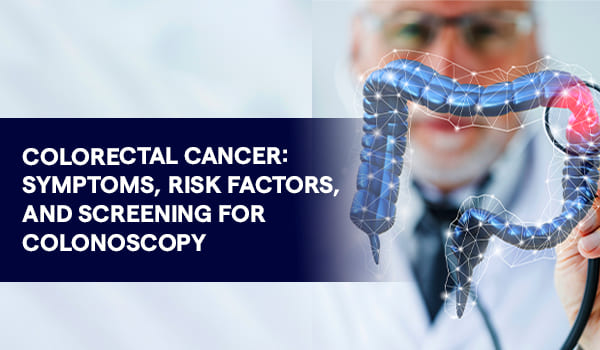
One of the challenges in detecting colorectal cancer early is that it often does not cause any symptoms in the early stages. Some common colorectal cancer symptoms include:
Blood in the stool: This can appear bright red, especially if the bleeding is from the lower intestines, or dark red or maroon if the blood originates higher in the colon. Blood loss may not be visible in every bowel movement, so it's important to be consistent when observing your stool.
Changes in bowel habits: This can be done in several ways:
Diarrhea: Frequent loose stools that persist for days could be a sign of colorectal cancer.
Constipation: Difficulty passing stool or having infrequent bowel movements can also be a symptom.
Narrow stools: Stools that appear thinner than usual may indicate a tumor-caused blockage in the colon.
Abdominal pain or cramping: Persistent pain or cramping in your belly can be a red flag.
Unexplained weight loss
Fatigue or weakness: Various factors can cause fatigue and a lack of energy, but persistent fatigue that doesn't improve with rest might be a sign of something underlying, like cancer.
Feeling like the bowel doesn't empty: Even after having a bowel movement, you may still feel the urge to go or have a sensation of incomplete evacuation.
If you experience any of the symptoms mentioned above, it is important to consult with a doctor for further evaluation. Early detection and treatment are key to improving the prognosis of colorectal cancer.
Several factors increase the risk of developing colorectal cancer.
Age: Colorectal cancer is more prevalent in older adults, with the majority of cases diagnosed in people over the age of 40–50.
Family history: People with a family history of colorectal cancer or polyps are at higher risk.
Personal history of inflammatory bowel disease (such as Crohn's disease or ulcerative colitis)
Lifestyle factors: obesity, lack of physical activity, smoking, and a diet high in red and processed meats increase the risk of colorectal cancer.
Certain genetic conditions, such as Lynch syndrome or familial adenomatous polyposis,
It is important to be aware of these risk factors and take preventive measures to reduce the risk of developing colorectal cancer. This includes maintaining a healthy lifestyle, participating in regular physical activity, and undergoing recommended screening tests.
Screening for a colonoscopy
Early detection of colon cancer saves lives. That's why getting screened is so important. One of the best ways to do this is with a colonoscopy. This procedure lets your doctor see the inside of your colon and rectum for any problems like polyps or growths that could turn cancerous.
Screening colonoscopy is recommended starting at the age of 50 years but preferably should be done at the age of 45 or earlier if there are risk factors or there is a family history of colorectal cancer.
During a colonoscopy, a thin, flexible tube with a tiny camera is inserted through your rectum and into your colon. This lets the doctor see the lining on a screen, take out any polyps they find, and even get tissue samples for further testing if needed. polyps, take tissue samples for further testing if necessary.
While the thought of undergoing a colonoscopy may be intimidating for some, it is a relatively safe and effective procedure that can significantly reduce the risk of developing colorectal cancer. The procedure is usually performed under sedation, so you will not feel any pain or discomfort during the examination.
In addition to colonoscopy, there are other screening tests available for colorectal cancer, such as fecal occult blood tests (FOBT) or stool DNA tests. These tests can detect blood or abnormal DNA in the stool, which may indicate the presence of colorectal cancer or polyps.
Don't Ignore Your Gut: Schedule a Colorectal Cancer Screening at Sir Ganga Ram Hospital the radiation oncology hospital in Delhi.
Colorectal cancer is a serious health problem, but early detection is key to successful treatment. Sir Ganga Ram Hospital offers comprehensive colorectal cancer screening, including colonoscopy, to help you stay healthy.
Why choose Sir Ganga Ram Hospital for colorectal cancer screening?
Expert Care: Our team of experienced Gastroenterologists / colorectal surgeons uses the latest technology and techniques for accurate diagnosis and treatment.
Advanced Facilities: We offer state-of-the-art facilities for a comfortable and efficient screening experience.
Personalized Approach: We understand your concerns and work with you to develop a personalized screening plan based on your risk factors.
Take Charge of Your Health:
Know the symptoms: Learn about the common signs of colorectal cancer, including blood in the stool, changes in bowel habits, and unexplained weight loss.
Get Screened: Schedule a colonoscopy or discuss alternative screening options with your doctor. Early detection saves lives.
Book an appointment with Sir Ganga Ram Hospital for more information.